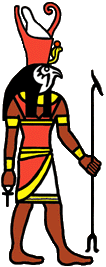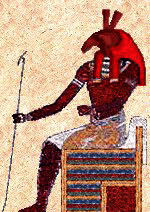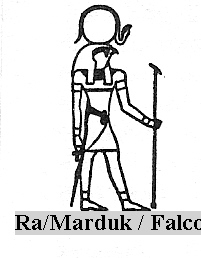Published: Naville, Das Aegyptische Todtenbuch, pl. cxxiv.
Translated: Budge, Book of the Dead, ch. cxii.
The so-called Book of the Dead is a compilation of texts which are found, written on papyri or on coffins, in the tombs. No copy containing all the chapters is known; the order has therefore been arranged from a comparison of many examples.
The ancient name of these texts is “Chapters of Coming forth to the Day”; the modern name is “Book of the Dead,” as it is evidently a manual for the use of the dead. It consists of a series of prayers, hymns, magical formula, and allusions to mythological stories, a knowledge of which was considered necessary in order to escape the perils and dangers of the life hereafter. It is obviously very ancient, for even in the earliest known examples, the Pyramid Texts of the fifth dynasty, the text is often very corrupt. The Pyramid Texts show traces of very primitive usages and cults, many of which are lost in the later forms of the Book of the Dead.
The story related under the name of the Black Pig refers to an incident in the war between Horus and Set, and is not known elsewhere. Probably many such legends were current in ancient Egypt, but few have been preserved to us intact. Horus was the great hero-god, and, like the heroes of other countries, he absorbed all the legends of local champions. Some of his exploits and adventures seem to have been so well known that a mere allusion was sufficient to recall them to the mind of the reader. Sometimes a short and, to us confused account is given, as in chapter cxiii of the Book of the Dead, where the restoration to Horus of his hands and arms, which have been lost in a swamp, is related in a manner which conveys very little to the modern reader.
A great number of legends have been preserved in magical papyri, but even among these the quantity of tantalizing allusions is larger than the number of complete legends. Thus, in the Demotic Papyrus of London and Leyden, a charm against fever begins “Horus was going up a hill at midday in the verdure season, mounted on a white horse.” He finds the gods eating, and they invite him to join them, but he refuses as he has fever. This is all that is said, but it is evidently an allusion to a well-known story.
(Texts: All Artifacts, Color Coding, & Writings in Bold Type With Italics Inside Parenthesis, are Added by Editor R. Brown, not the Authors, Translators, or Publishers!)
(gods in blue)
The reason why the city of Pé was given to Horus, I know and I will tell you.
Between Horus and Set (Seth) there is enmity and hatred, war and battle.
Ever the fight goes on and the combatants rage furiously,
and victory is not yet declared to either, though the Gods are with Horus.
Now Set is cunning and crafty, and seeks to conquer
by subtlety rather than by courage and skill in the fray;
and such power is his that he can take what form he will and deceive both men and Gods.
This is the power of Set, but the power of Horus is not the same;
for to Horus belong righteousness and truth; deceit and falsehood are not in him.
Who so gazes into the blue eyes of Horus can see the future reflected there,
and both Gods and men seek Horus to learn what shall come to pass.
It came to the knowledge of Set that Ra (Marduk) would consult with Horus,
and it seemed to him that an opportunity was at hand to injure Horus,
so he took upon himself the form of a Black Pig.
Fierce was his aspect, long and sharp his tushes, and his color was the blackness of the thundercloud;
savage and evil was his look, and struck fear into the hearts of men.
Then came the Majesty of Ra to Horus and spoke to him saying,
“Let me look in thine eyes and behold what is to come.”
And he gazed into the eyes of Horus, and their color
was that of the Great Green Waters when the summer sky shines upon them.
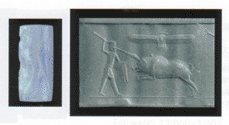 (wild boar under attack with observer above in his winged sky-disc)
(wild boar under attack with observer above in his winged sky-disc)
And while he gazed, the Black Pig passed by.
Ra knew not that it was the Evil God, and he cried out to Horus and said,
“Look at that Black Pig! Never have I seen one so huge and so fierce.”
And Horus looked; neither did he know Set in this strange form,
and thought it was a wild boar from the thickets of the North Country.
Thus he was off his guard and unprotected against his enemy.
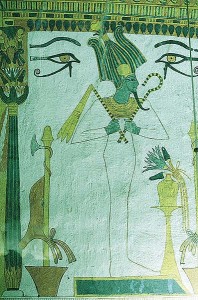 (giant alien gods of Mesopotamia & Egypt)
(giant alien gods of Mesopotamia & Egypt)
Then Set aimed a blow of fire at the eye of Horus,
and Horus shouted aloud with the pain of the fire, and raged furiously, and cried,
“It is Set, and he has smitten me with fire on the eyes.”
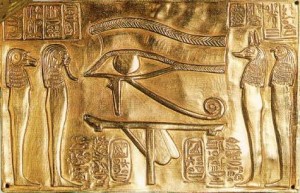 (eye of Horus, symbol widely in use today)
(eye of Horus, symbol widely in use today)
But Set was no longer there, for he had conveyed himself away, and the Black Pig was seen no more.
And Ra cursed the pig because of Set, and said,
“Let the pig be an abomination to Horus (son to Ashur / Orien / Osiris).”
And to this day men sacrifice the pig when the Moon is at the full,
because Set, the enemy of Horus, and the murderer of Osiris (Ashur, Marduk‘s deceased son),
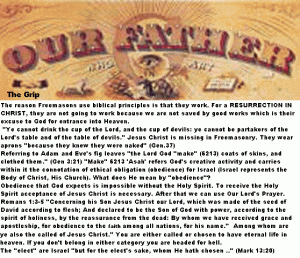 (alien blue eye of Horus)
(alien blue eye of Horus)
took its form in order to injure the blue-eyed God.
And for this reason also swineherds are unclean throughout the land of Egypt;
never may they enter the temples and sacrifice to the Gods,
and their sons and daughters may not marry with the worshipers of the Gods.
And when the eyes of Horus were healed, Ra gave to him the city of Pé,
and he gave to him two divine brethren in the city of Pé, and two divine brethren
in the city of Nekhen to be with him as everlasting judges.
Then was the heart of Horus glad and he rejoiced,
and at the joy of Horus the earth blossomed, and thunderclouds and rain were blotted out.
